On March 23rd, the 2025 Luojia Big Data Forum of Wuhan University was held. The forum brought together numerous experts and scholars from both academic and industrial communities, and they conducted in-depth discussions around the theme of Industrial Intelligence, Innovation Space, and New-quality Development. Wei Lu, Vice President of Wuhan University; Feicheng Ma, University Distinguished Professor in Humanities and Social Sciences, and Founding Dean of Wuhan University Big Data Research Institute; Guoqing Chen, University Distinguished Professor in Liberal Arts, and Deputy Director of Academic Committee of Tsinghua University; and other VIPs attended the forum. Jun Tao, Secretary of the CPC Committee of the School of Information Management of Wuhan University, presided over the opening ceremony.
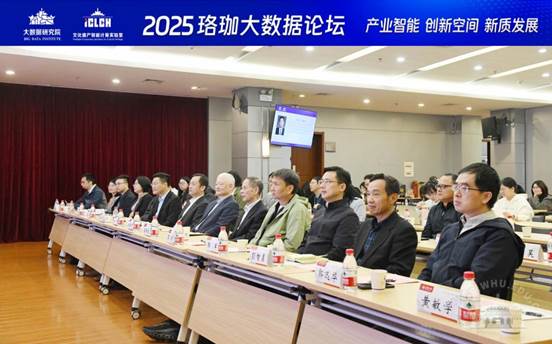
Wei Lu extended a warm welcome to the experts and scholars. He pointed out that the core of this forum was to empower with data intelligence, aiming to deeply explore the important role of big data and artificial intelligence in promoting scientific and technological innovation and industrial transformation. He emphasized that artificial intelligence, as a new development engine, was injecting new vitality into all industries. How to use the new intelligent productivity to empower disciplinary development had become an important issue that needed to be solved urgently at present. Wei Lu expected that the insights of the three keynote speakers could inspire everyone, and he sent his best wishes to the participants via the beautiful scenery of cherry blossoms in Wuhan University.
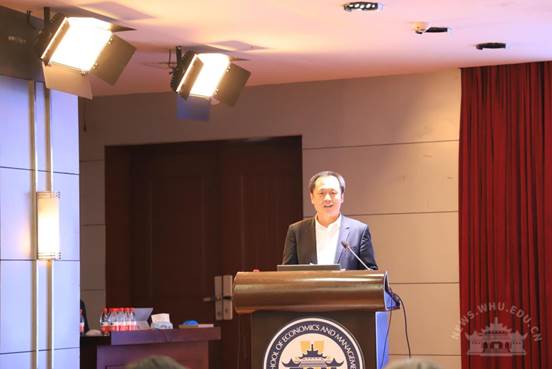
Feicheng Ma expressed his congratulations on the opening of the forum. He pointed out that this forum focused on topics such as big data, industrial intelligence, innovation space, and new-quality development, closely centered around the major national needs and served the national development strategy. Feicheng Ma said that the research should focus on multiple intelligent fields such as data intelligence, market intelligence, risk intelligence, and policy intelligence. Through the research on the intelligent agent system, it could promote industrial upgrading and intelligent innovation, help China achieve breakthroughs in key core technologies, and shift from following to leading in technology. These research topics would also lay a solid foundation for the development of philosophy and social sciences in China.

In the keynote speech session, Guoqing Chen delivered a speech titled Research on Big Data Management and Decision-making: Frontier Exploration and New Topics. He reviewed China's forward-looking strategic layout in the field of big data and pointed out that with the deep integration of big data and artificial intelligence, academic research and industrial development had shifted from dataization to digital intelligence. He focused on elaborating the new characteristics of management decision-making in the era of big data: the decision-making subject had evolved into the collaboration between humans, intelligent machines, and intelligent systems, and the decision-making boundary was constantly expanding, which promoted the leapfrog development in four dimensions: decision-making paradigm, analysis technology, resource governance, and enabling innovation. Guoqing Chen put forward new research topics and paradigms with digital empowerment as the core, and at the same time, he called on the academic community to face up to the limitations of artificial intelligence technology and its constraints on social science research, and uphold the research spirit of integrity and innovation.
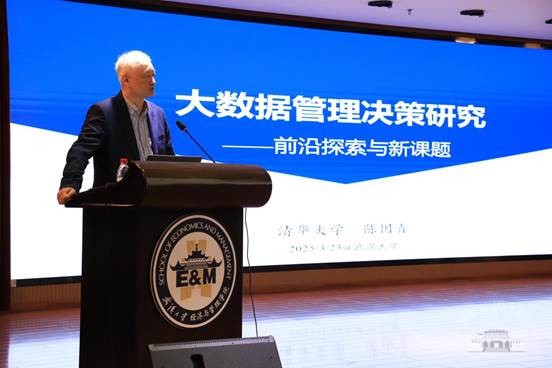
Gang Li, Chief Expert of the Innovation Group of the National Natural Science Foundation of China (2018), Deputy Director of the Academic Committee of Wuhan University, and Director of the Sub-committee of the Social Sciences Division of Wuhan University, shared a report titled Industrial Intelligence Based on Cognitive Computing. He pointed out that the cognitive ability and versatility of artificial intelligence were constantly improving, and the application scenarios were accelerating innovation. He also analyzed the underlying logic and practical challenges of the integration of data intelligence and the real industry. Gang Li introduced in detail the innovative achievements of his research team in the field of digital intelligence empowerment in vertical scenarios. The cognitive computing solution proposed by the team, through steps such as scenario deconstruction, task decomposition, problem-solving, and cognitive computing, had built a cognitive computing system driven by both data and knowledge, promoting the scenario-based digital intelligence transformation. He also introduced the core technologies in the cognitive computing solution, including the object model, logic chain, and cognitive computing engine, etc., and combined with the practical case of the State Grid, he shared the experience of integrating multi-source data and advanced technologies to achieve refined management and optimization.
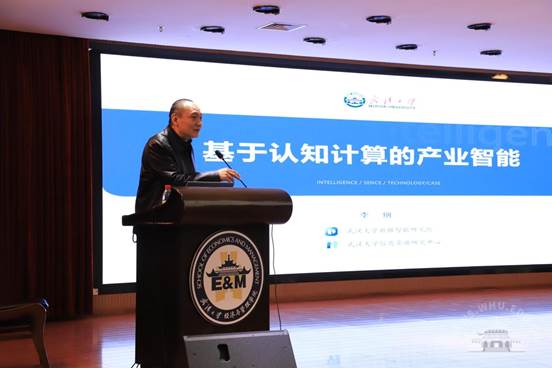
Chunjiang Lu, Director of the Big Data Platform and Information Department of Shenzhen National High-tech Industry Innovation Center, delivered a report titled Building a Characteristic High-end Think Tank with Double-wheel Drive of Data and Technology and Collaborative Empowerment of Platform and Ecology. He introduced the development history, organizational structure, and team building of the Shenzhen National High-tech Industry Innovation Center, elaborated on the exploration achievements of the center in high-end think tank building, platform operation, and innovative collaborative services, discussed the construction ideas of the characteristic high-end think tank, and shared a new paradigm of intelligence service with the DIKI model as the core based on user needs and technical support. Chunjiang Lu said that the center would build an open innovation intelligence ecosystem driven by "DATA+AI", integrating theory, technology, method, and impartiality, and build a scenario-based and customized data service platform to provide strong support for government’s decision-making.
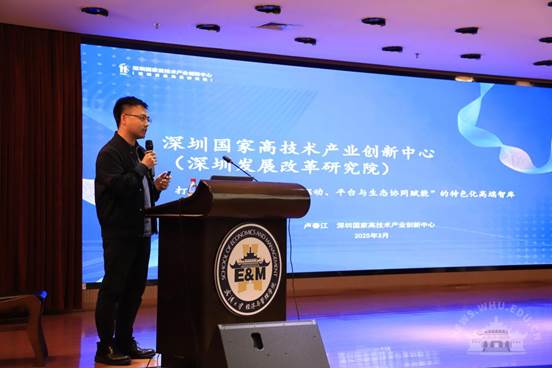
The forum sessions in the afternoon was presided over by Minxue Huang, Deputy Dean of the Big Data Research Institute of Wuhan University and Associate Dean of the School of Economics and Management of Wuhan University. Feicheng Ma and Guoqing Chen attended the meeting. Xunhua Guo, Executive Deputy Director of the China Retail Research Center of the School of Economics and Management of Tsinghua University, Ming Ren, Associate Dean of the School of Information Resource Management of Renmin University of China, Fue Zeng, Professor at the School of Economics and Management of Wuhan University, Cong Wang, Assistant Professor at the Guanghua School of Management of Peking University, Xiangyu Li, Assistant Professor at the International Business School of Jinan University, and other experts participated in the discussion. Minxue Huang introduced the general information of the Big Data Research Institute of Wuhan University, demonstrated the construction achievements of intelligent decision-making and innovation space, proposed a new research paradigm of digital intelligence social sciences, "Big Data + Small Knowledge = Big Knowledge", and put forward the construction of a "Five-in-One" interdisciplinary frontier research platform of "government, industry, university, research, and application", which was co-created, shared, open, and open-source. He also shared the project achievements such as digital intelligence scenario computing, the Global Innovation Index, the Zhirong Financial Big Data Platform, the Thought Luojia, and the Vitality Index of High-quality Development. The participating experts and scholars had an in-depth discussion on the innovative path of the deep integration of digital intelligence technology and humanities and social sciences research.
This Luojia Big Data Forum was jointly hosted by the Big Data Research Institute of Wuhan University and the Philosophy and Social Sciences Laboratory of the Ministry of Education for Intelligent Computing of Cultural Heritage. The School of Information Management, the School of Economics and Management, the Institute of Data Intelligence, and the Laboratory of Industrial Intelligence Innovation Space of Wuhan University provided academic support. Since its establishment, this forum has been successfully held for seven sessions. It has always been committed to building an interdisciplinary platform for ideological exchanges centered on the development of the data-driven research paradigm of humanities and social sciences for scholars, and contributing the wisdom of Wuhan University to the construction of an independent knowledge system in the new era.